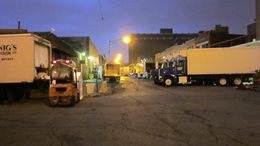 MPG vs. Time-It is Complicated
MPG vs. Time-It is Complicated
I have been reading Henry Albert’s series on the 55 mpg experiment with great interest. The experiment ended due to time constraints. Increasing fuel mileage would make me more profitable. Driving about 120,000 miles per year a 1 mpg increase from 7-8 mpg saves me about $8500. Fuel savings like that could pay for that new pontoon boat that I have always wanted. Nothing happens in a vacuum. Driving slower saves fuel, but costs time. What our problem comes down to is at what point is the time cost outweigh the fuel cost.
Sure we could calculate a breakeven point. If you get 9mpg at 55 mph and 8 mpg at 65 mph, and your freight pays you $1.50 per mile. You could draw a graph and see where the lines meet. But every day, sometimes every hour, the factors change. The idea is to be aware of the changes. Always run the most profitable speed for the moment that you are in.
It interests me that airlines make the same choices. My flight from Portland to Chicago was late leaving Portland. The pilot explained over the intercom that they were late getting started because of FAA regulations requiring a 10 hour break. I might argue that the reason the flight was leaving late  was because the pilot started his 10 hour break less than 10 hours before he needed to be there for his next flight. The flight landed in Chicago about 15 minutes early. I wondered, do pilots gas on it when they were running behind schedule? I struck up a conversation with an airline employee. We were talking about fuel costs in the trucking and the airline business. Fuel is a huge cost for the airlines. I told him that I usually drive to save fuel. That if the situation calls for it I pick it up a notch. He said that airlines do the same thing.
was because the pilot started his 10 hour break less than 10 hours before he needed to be there for his next flight. The flight landed in Chicago about 15 minutes early. I wondered, do pilots gas on it when they were running behind schedule? I struck up a conversation with an airline employee. We were talking about fuel costs in the trucking and the airline business. Fuel is a huge cost for the airlines. I told him that I usually drive to save fuel. That if the situation calls for it I pick it up a notch. He said that airlines do the same thing.
We have to keep reevaluating the equation. My favorite run goes from Green Bay, WI to Albany, GA. That run brings me through Chicago (I avoid the toll way). Indianapolis and Louisville are along the way too. Usually they are not a problem because I hit them long after rush hour is over. The next day I try to hit Nashville immediately after the morning rush. Then the goal is to get through Atlanta before the afternoon rush. This can get tight because Nashville is on central time and Atlanta is in the eastern time zone. Does picking it up between Nashville and Atlanta make sense? Sitting in rush hour traffic wastes time and fuel-so in that case the answer is yes.
Our business is constantly changing. Balancing the equation between speed and fuel usage is a decision we all need to evaluate on a continuous basis. Sometimes we need to pick it up to make an appointment, or the birth of a grandchild. There is no one right answer except to drive smart.